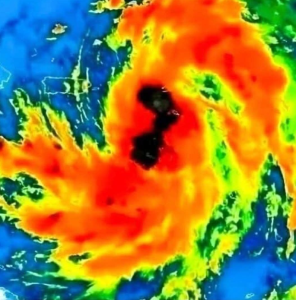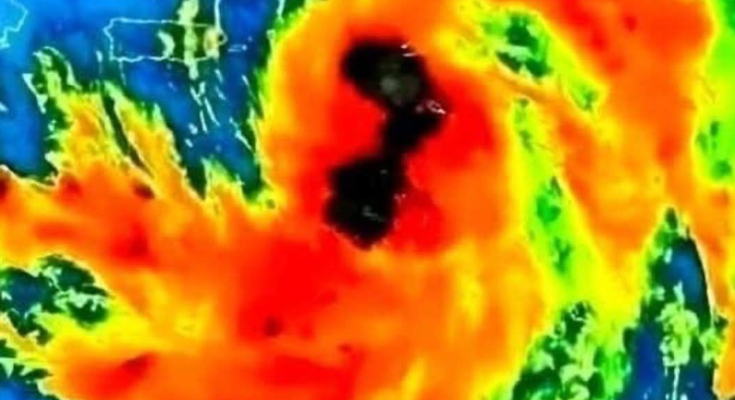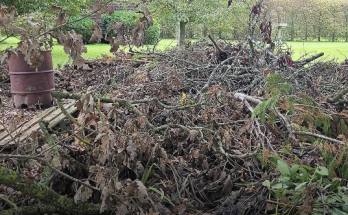
Extreme Conditions Across the Caribbean and Southeast US: Floods, Dust, and Potential Storms
The Caribbean and the Southeast United States are no strangers to powerful weather, but every so often, nature stitches together a combination so intense, so unpredictable, that it feels like the atmosphere is writing its own epic story. Over the course of a few days, three forces began unfolding at once: flooding rains, dust-laden skies, and the quiet but looming possibility of a developing storm system just off the coast. For millions of people, it became a week filled with warnings, uncertainty, and moments that reminded everyone how unpredictable the world can be.
The first signs of trouble began with the rain.
Across the Southeast U.S.—from Florida through Georgia and into the Carolinas—skies opened with a relentless, unforgiving downpour. Streets transformed into rivers within minutes as water surged through neighborhoods, swallowing sidewalks, creeping into homes, and leaving cars stranded like islands in the middle of a growing sea. It wasn’t just a passing shower; it was the kind of rain that hammered rooftops like a thousand tiny fists, that made people stop mid-sentence and turn their heads toward the window.
Meteorologists warned that the system was slow-moving, trapped between pressure patterns that refused to let it pass. The result was atmospheric stagnation — a storm that simply wouldn’t leave. In some towns, a month’s worth of rain fell in just 24 hours. Drainage systems overflowed, creeks burst through their banks, and emergency crews scrambled through thigh-deep water carrying families to safety.
While the Southeast struggled to stay afloat, hundreds of miles to the south, a very different force of nature was blowing in.
Across the Caribbean, an enormous cloud of Saharan dust swept across the Atlantic like a ghostly curtain, carried by the powerful trade winds. From Puerto Rico to Jamaica, from the Bahamas to the Dominican Republic, people woke up to hazy, copper-tinted skies. Sunrises turned fiery red, sunsets glowed orange like distant flames. The dust dimmed the sunlight, thickened the air, and cast an eerie stillness over the islands.
It was as if two worlds were colliding — one drowning in water, the other suffocating in dust.
Residents described the air as heavy, almost metallic. Visibility dropped, outdoor workers covered their faces, and health officials urged everyone to stay indoors if possible. Allergies flared. Asthma attacks surged. Even those who had lived through countless dust events commented that this one felt different — thicker, more persistent, and more widespread than usual.
The strange combination created an atmosphere of tension across the region. Flooding to the north. Dust to the south. And in between… something else was brewing.
Off the coast — somewhere between the Caribbean warmth and the Atlantic moisture — a broad area of unsettled weather began gathering strength. At first, it was nothing more than a cluster of thunderstorms swirling without direction. But the environment was unstable, the waters were warm, and the winds were beginning to align in a way that raised an eyebrow among forecasters.
In their calm but serious tone, meteorologists began using a phrase everyone recognized: “We’re monitoring a potential development.”
Those words were enough to spark anxiety from Miami to Barbados. Because people in this part of the world understand all too well: potential storms can transform into full-fledged systems with astonishing speed.
Rumors spread faster than forecasts. Some believed a tropical storm was inevitable. Others claimed it would curve out to sea. Many simply watched the satellite loops with quiet dread. Stores began restocking sandbags and bottled water. Social media feeds filled with dramatic cloud photos and early preparedness reminders. Even without a named storm, the possibility alone was enough to stir the region into alertness.
And as all this unfolded, each force interacted with the others in unexpected ways.
The Saharan dust, while harsh on the lungs and irritating to the eyes, actually had one surprising advantage: it tends to suppress storm formation. Dust dries out the atmosphere, making it harder for thunderstorms to strengthen. It was nature’s paradox — the same phenomenon that brought hazy skies to millions might have been the only thing preventing a tropical system from exploding into something more dangerous.
Meanwhile, the flooding in the Southeast U.S. continued, fed by moisture that drifted up from the tropics. In some cities, people watched the skies with disbelief as rain continued hour after hour, pounding roofs and pooling against doorways. Emergency alerts crackled through phones. Schools closed. Roadways collapsed under rushing water.
For many, it became a week of vigilance.
Parents stayed awake through the night listening for the sound of rising water. Fishermen studied the sea, noting how unusual the tides felt. Farmers watched their fields disappear under mud. Pilots reported turbulence and reddish visibility haze as they flew through the edge of the dust plume. Coastal towns checked their storm drains again and again, desperate to prevent another overflow.
But amid the chaos, there were moments of resilience and humanity too.
Neighbors formed chains to help each other move furniture away from rising water. Volunteers delivered masks and asthma inhalers to those struggling with the dusty air. Meteorologists worked nonstop, updating communities with new guidance every hour. And even though the natural forces felt overwhelming, people leaned on one another with the quiet understanding that they had survived storms before — and they would again.
By the end of the week, the worst of the rain finally began to drift northeast. The dust, too, started to thin as the winds carried it further west. And the developing system in the Atlantic remained just that — developing, watched closely but still unformed, its future uncertain.
But one thing became clear:
This was not just a weather event.
It was a reminder — of the fragility of life, the power of the planet, and the resilience of the people who call these regions home.
In the Caribbean, the sunsets slowly returned to their normal gold. In the Southeast, the waters began to drain away. And across both regions, people exhaled, grateful for the calm, even if it was temporary.
Because everyone knows:
The weather may change, the storms may pass, but the strength of those who endure them is what truly defines these places.

